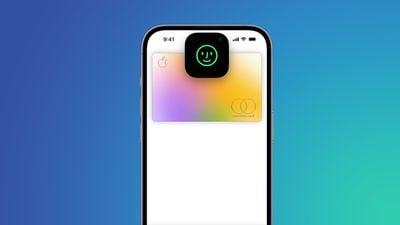iPhone 16 Pro Rumored to Feature Under-Display Face ID Next Year
The iPhone 16 Pro will feature under-display Face ID technology to provide more usable display area, according to The Elec.

The Korean-language report explains that Apple will move the components required for Face ID authentication directly under the iPhone's display in 2024. When not in use, the TrueDepth camera for Face ID will not be visible under the display, which will appear seamlessly contiguous with the surrounding screen area.
The report clarified that the hole in the display for the front-facing camera will remain on the iPhone 16 Pro, but the overall display area and sense of immersion will be improved. It added that the display cutouts will remain the same from the iPhone 14 Pro to the iPhone 15 Pro later this year since the under-display technology is not yet ready.
It also corroborated rumors that all four models in the iPhone 15 lineup will offer the Dynamic Island, expanding the feature from the iPhone 14 Pro and iPhone 14 Pro Max to the two standard models later in 2023.
Further in the future, the report added that once Apple has implemented under-display Face ID technology, it will move to adopt an underpanel camera (UPC), thereby eliminating all of the display cutouts currently present on the iPhone.
This aligns with the roadmap set out by display analyst Ross Young in May 2022. He outlined a cycle where Apple will alternate between the Pro and the non-Pro models each year when introducing revised display cutouts or new under-display technology:
The Pro models will be first to new display innovations of this kind, as first seen last year with the Dynamic Island on the iPhone 14 Pro and iPhone 14 Pro Max, while the iPhone 14 and iPhone 14 Plus were left with the same "notch" as the iPhone 13. This also means that each configuration of display cutouts and underpanel technology will persist for a maximum of two generations on each iPhone before the device has total usable display area sometime around 2027.
Popular Stories
While the iPhone 17 Pro and iPhone 17 Pro Max are not expected to launch until September, there are already plenty of rumors about the devices.
Below, we recap key changes rumored for the iPhone 17 Pro models as of April 2025:
Aluminum frame: iPhone 17 Pro models are rumored to have an aluminum frame, whereas the iPhone 15 Pro and iPhone 16 Pro models have a titanium frame, and the iPhone ...
Apple may have updated several iPads and Macs late last year and early this year, but there are still multiple new devices that we're looking forward to seeing in 2025. Most will come in September or October, but there could be a few surprises before then.
We've rounded up a list of everything that we're still waiting to see from Apple in 2025.
iPhone 17, 17 Air, and 17 Pro - We get...
A common complaint about the iPad Pro is that the iPadOS software platform fails to fully take advantage of the device's powerful hardware.
That could soon change.
Bloomberg's Mark Gurman today said that iPadOS 19 will be "more like macOS."
Gurman said that iPadOS 19 will be "more like a Mac" in three ways:Improved productivity
Improved multitasking
Improved app window management...
Apple's upcoming foldable iPhone (or "iPhone Fold") will feature two screens as part of its book-style design, and a Chinese leaker claims to know the resolutions for both of them.
According to the Weibo-based account Digital Chat Station, the inner display, which is approximately 7.76 inches, will use a 2,713 x 1,920 resolution and feature "under-screen camera technology." Meanwhile, the...
Apple in October 2024 overhauled its 14-inch and 16-inch MacBook Pro models, adding M4, M4 Pro, and M4 Max chips, Thunderbolt 5 ports on higher-end models, display changes, and more. That's quite a lot of updates in one go, but if you think this means a further major refresh for the MacBook Pro is now several years away, think again.
Bloomberg's Mark Gurman has said he expects only a small...
Apple is working on a new version of the Vision Pro with two key advantages over the current model, according to Bloomberg's Mark Gurman.
Specifically, in his Power On newsletter today, Gurman said Apple is developing a new headset that is both lighter and less expensive than the current Vision Pro, which starts at $3,499 in the U.S. and weighs up to 1.5 pounds.
Gurman said Apple is also...
On this week's episode of The MacRumors Show, we catch up on the latest iOS 19 and watchOS 12 rumors, upcoming devices, and more.
Subscribe to The MacRumors Show YouTube channel for more videos
Detailed new renders from leaker Jon Prosser claim to provide the best look yet at the complete redesign rumored to arrive in iOS 19, showing more rounded elements, lighting effects, translucency, and...
It was a big week for leaks and rumors in the Apple world, with fresh claims about iOS 19, the iPhone 17 Pro, and even the 20th anniversary iPhone coming a couple of years from now.
Sources also spilled the tea on the inner turmoil at Apple around the Apple Intelligence-driven Siri revamp that has seen significant delays, so read on below for all the details on these stories and more!
iOS ...
Apple and other electronics manufacturers have received a break from Trump's reciprocal tariffs, with the U.S. Customs and Border Protection agency sharing a long list of products excluded from the levies last night.
iPhones, Macs, iPads, Apple Watch, and other Apple devices will not be subject to the 125 percent tariffs that have been put in place on imported Chinese goods, nor will Apple...
























